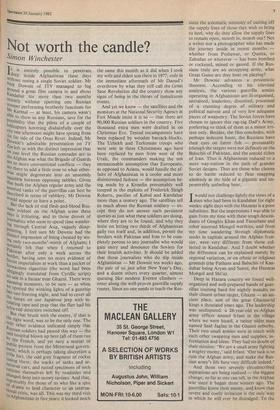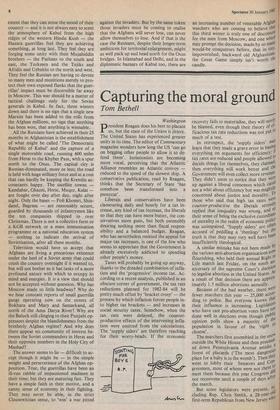Not worth the candle?
Simon Winchester
It is entirely possible to penetrate deep inside Afghanistan these days without seeing a single Soviet soldier. Mr Nick Downie of ITV managed to lug Found a great film camera in and about Kandahar for more than two months recently without spotting one Russian Mr performing brotherly functions for L'ir Karma! — at least, his camera wasn't able to show us any Russians, save for the Possibility [hovering te pilots of a couple of hellcopters g disdainfully over the city one afternoon might have sprung from the far side of the Oxus River. Indeed, Mr u,oWnie's admirable presentation on TV tYe left us with the distinct impression that °,11 one level the Russian comrades are to the Afghan war what the Brigade of Guards are to more conventional conflicts — they are there to add a little tone to what other- /vise might degenerate into an unseemly squabble between opposing rabbles. Given that both the Afghan regular army and the as, soiled ranks of the guerrillas can best be described in terms of rabblery, Mr Downie would appear to have a point. But the lack of real flesh-and-blood Rus- sians evident on the Afghan scene these days is irritating, and to those droves of Journalists who seem to spend time wander- log through Central Asia, vaguely disap- Do_ lilting. I feel sure Mr Downie had the Fistula impression of being cheated by see- ing two-months'-worth of Afghans; I certainly felt that when I returned to Pakistan after only a week across the border having seen no more evidence of
Stewardess imperialism at work than a packet of
'tewardess cigarettes (the word had been obligingly translated from Cyrillic script) °11 sale in a bazaar near Ghazni. There were alarming moments, to be sure — as when lye spotted the winking lights of a gunship ,a,te one freezing night, and had to cover all 'ne lamps on our Japanese jeep with in- sulating tape and pray that the flier had his Infra-red detectors switched off. But that brush with the enemy, if that is the right word, was to be the only one. The °,,1-11Y other evidence indicated simply that Russian soldiers had passed this way — the Pd hospital blown up here (all of them run oY the French, and yet nary a mutter of public protest from the Mitterrand govern- 'ent, which is perhaps taking discretion a trifle far), the odd grey fragment of rocket eas111. •
were, the tracks of tanks and ar- inoured cars, and rusted specimens of such vehicles themselves left by roadsides and
lunged deep into snowy ravines. And that, tegrettably for those of us who like a spot :).1 drama to lend character to an internal crisis, was all. This was my third visit t0 Afghanistan in five years: it looked much
the same this month as it did when I took my wife and eldest son there in 1977; only in the immediate aftermath of Mr Daoud's overthrow by what they still call the Great Saur Revolution did the country show any signs of being in the throes of tumultuous events.
And yet we know — the satellites and the monitors at the National Security Agency at Fort Meade insist it is so — that there are 90,000 Russian soldiers in the country. Five thousand extra men were drafted in on Christmas Eve. Tented encampments have been replaced by wooden barrack-blocks. The Uzbekh and Turkoman troops who were sent in three Christmases ago have been replaced by men from west of the Urals, the commanders making the not unreasonable assumption that Europeans, as opposed to Asians, would handle the af- fairs of Afghanistan in a cooler and more disinterested fashion — the assumption be- ing made by a Kremlin presumably well steeped in the exploits of Frederick Sleigh Roberts, pacifier of Kabul and Kandahar more than a century ago. The satellites tell us much about the Russian soldiery — ex- cept they do not answer such persistent queries as just what these soldiers are doing, where they are to be found, and why they insist on letting two thirds of Afghanistan gaily run itself and, in addition, permit the borders with Pakistan and Iran to be com- pletely porous to any journalist who would gain entry and denounce the Soviets for their brutish activities. It should be added that those journalists who do slip inside Afghanistan — Mr Downie ten weeks ago, the pair of us just after New Year's Day, and a dozen others every quarter, almost queuing like modern Everest climbers — enter along the well-proven guerrilla supply routes. Since no one needs to teach the Rus-
sians the axiomatic necessity of cutting off the supply lines of those they wish to bring to heel, why do they allow the supply lines to remain open, month in, month out? Not a writer nor a photographer who has made the journey inside in recent months whether from Peshawar, or Quetta, or Zahedan or wherever — has been bombed or rocketed, mined or gassed. If the Rus- sians truly are an occupying army, what Great Game are they bent on playing?
Mr Downie advances a pessimistic theorem. According to his televised analysis, the various guerrilla armies operating in Afghanistan are ill-organised, untrained, leaderless, disunited, possessed of a stunning degree of military and political naivete and of very few adequate pieces of weaponry. The Soviet forces have chosen to ignore this rag-tag Dad's Army, preferring to think of them as a minor irri- tant only. Besides, the film concludes, with perhaps indecent haste, the Russians have their eyes on fatter fish — presumably (though the targets were not defined) on the Baluchis of Pakistan, and the untold riches of Iran. Thus is Afghanistan reduced to a mere way-station in the path of grander Soviet designs. Thus are those who choose to do battle reduced to fleas snapping aimlessly at the hide of a gigantic and im- penetrably unfeeling bear.
T would not challenge lightly the views of a 'man who had been in Kandahar for eight weeks: eight days with the Hazaras is a poor substitute. But the impressions I was able to gain from my time with these tough descen- dants of Genghis Khan and Timurlane and other assorted Mongol worthies, and from 'my time wandering through diplomatic souks in capitals around .the Afghan fron- tier, were very different from those col- lected in Kandahar. And I doubt whether the difference can be explained merely by regional variation, or on ethnic or religious grounds (the Pathans and Baluchis of Kan- dahar being Aryan and Sunni, the Hazaras Mongol and Shi'a).
Deep in Hazara country we found well- organised and well-prepared bands of guer- rillas training hard for nightly assaults on their closest urban target, Ghazni — an an- cient place, seat of the great Ghaznavid kings a thousand years ago. The leadership was undisputed: a 26-year-old ex-Afghan army officer named Irfani in the village where we were based, a rather older man named Said Jaglan in the Ghazni suburbs. Their two small armies were in touch with each other swapping men and supplies, in- formation and ideas. They had no doubt of their mission: 'We are a small army fighting a mighty enemy,' said Irfani. 'Our task is to ruin the Afghan army, and make the Rus- sian army's life here very difficult indeed.'
And those two severely circumscribed aspirations are being realised — the biggest change, so far as one can tell, in the Afghan war since it began three winters ago. The guerrillas know their enemy, and, know that severe and costly irritation is the only way in which he will ever be dislodged. To the extent that they can sense the mood of their country — and it is not always easy to scent the atmosphere of Kabul from the high ridges of the western Hindu Kush — the Hazara guerrillas feel they are achieving something, at long last. They feel they are forging some unity with their Mujahiddin brothers — the Pathans to the south and east, the Turkmen and the Tajiks and Afridis and Uzbekhs to the north and west. They feel the Russian are having to devote so many men and munitions merely to pro- tect their own exposed flanks that the guer- rillas' impact must be discernible far away in Moscow. This war should be a matter of tactical challenge only for the Soviet generals in Kabul. In fact, three winters down and there is no sign that a single new Marxist has been added to the rolls from the Afghan millions, no sign that anything has been won, that anything is winnable.
All the Russians have achieved in their 25 months in Afghanistan is the establishment of what might be called 'The Democratic Republic of Kabul' and the capture of a single motorable road, running 600 miles from Herat to the Khyber Pass, with a spur north to the Oxus. The capital city is Russian-dominated, more or less; the road is held with huge military force and at a cost that can hardly be keeping the Kremlin ac- countants happy. The satellite towns Kandahar, Ghazni, Herat, Muqur, Kalat are fought over day after day, night after night. Only the bases — Poli Khomri, Shin- dand, Bagram — are reasonably secure, guarded by thousands of infantrymen like the ten companies shipped in over Christmas. There is not a collective farm or "a KGB network or a mass immunisation programme or a national education system — nothing to indicate the arrival of Sovietisation, after all these months.
Television would have us accept that Afghans are living a precarious existence under the heel of a Soviet army that could crush the country overnight if it wanted to, but will not bother as it has tasks of a more profound nature with which to occupy its mind and energies. It is a view that should not be accepted without question. Why has Moscow made so little headway? Why do we hear constant reports of small guerrilla gangs operating now on the streets of Bokhara and Mary and Samarkand, all north of the Amu Darya River? Why are the Baluch still clinging to their Punjabi op- pressors despite the blandishments from the brotherly Afghan regime? And why does there appear no community of interest be- tween the Soviet commanders in Herat and their opposite numbers in the Holy City of Mashad?
The answer seems to lie — difficult to ac- cept though it might be — in the simple weight and perseverance of the Afghan op- position. True, the guerrillas have been an ill-run rabble of impassioned madmen in their time; but they are maturing fast. They have a simple faith in their motive, and a canny sense of economy in their fighting. They may never be able, in the strict Clausewitzian sense, to 'win' a war pitted against the invaders. But by the same token those invaders must be coming to realise that the Afghans will never lose, can never allow themselves to lose. And if that is the case the Russians, despite their longer-term ambitions for territorial enlargement, might as well pack up and head north for the Oxus bridges. In Islamabad and Delhi, and in the diplomatic bazaars of Kabul too, there are
an increasing number of venerable Afghan watchers who are coming to believe that this third winter is truly one of discontent for the men from Moscow, and one which may prompt the decision, made by so man} would-be conquerors before, that in tin)', impoverished, backward old Afghanistan. the Great Game simply isn't worth the candle.



































 Previous page
Previous page